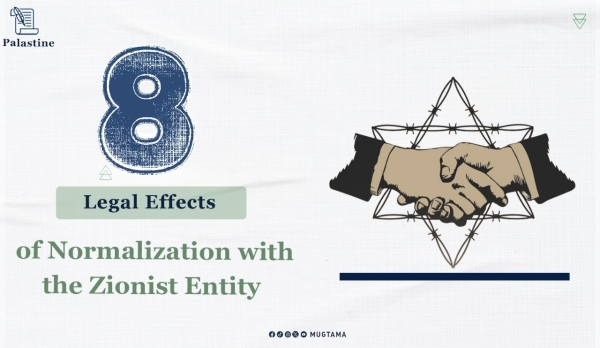The world has recently witnessed drastic changes in international relations, especially in the Middle East, where normalization with the Zionist entity has become one of the most controversial issues.
The normalization leads to a number of legal effects that impact local and international positions, including legal obligations, legislative amendments, and relationships with the Palestinian issue and the rights of refugees.
Here are the main effects:
- International legal obligations
Normalization involves ratifying the diplomatic peace agreements signed with the occupation, such as the Camp David or Oslo Accords, which imposes an obligation on the normalizing state to implement the provisions contained in those agreements. It also entails formal recognition of "Israel" as a sovereign state, thereby enhancing its status in the international community.
- Amendments to local legislation
Normalization may require amending national legislation, including lifting restrictions on trade and travel with the occupying entity. These amendments also encompass updating laws related to economic, cultural, and military relations between normalizing countries and "Israel.
- The change in the stance on the Palestinian issue
Normalization with the occupation may lead to a shift in legal positions regarding the Palestinian cause, particularly concerning the rights of Palestinians. This could be seen as a departure from traditional stances that supported Palestinian rights in the face of occupation.
- Commitment to international law
Normalization raises questions about the commitment of normalizing countries to international law, particularly concerning the Palestinian issue and human rights in the occupied territories. This may be seen as support for Israeli occupation policies.
- Legitimizing the occupation
Normalization with the occupation may contribute to granting legal legitimacy to the ongoing "Israeli" settlement in the occupied Palestinian territories, which is in contradiction with United Nations resolutions that condemn these policies.
- Damaging relationships with countries opposed to normalization.
Countries that normalize their relations with the Zionist entity may face tension in their legal relations with Arab and Islamic countries that reject normalization. This could lead to political and diplomatic complications in the regional landscape.
- International pressures
The states that normalize relations may face pressure from countries and human rights organizations opposing normalization, especially if it is seen as contributing to the continuation of the Israeli occupation policy against the Palestinians.
- Rights of Palestinian Refugees
Normalization may negatively affect the position of the normalizing country regarding the rights of Palestinian refugees, particularly concerning the right of return, which is rejected by "Israel." This impact may also be reflected in national legislation related to the rights of Palestinian refugees.
Read also : Normalization with Israel: Concept and Agreements


